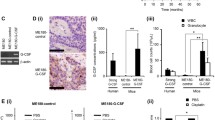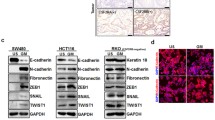Abstract
This report describes the effect of overexpressing granulocyte macrophage colony stimulating factor (GMCSF) in breast cancer cells, which otherwise is involved in proliferation and differentiation of granulocyte and macrophage lineages. The purified recombinant GMCSF cytokine is known to exert dose-dependent proliferative response on various cancer cells, but its effect during overexpression is yet to be evaluated. In our present study, we have generated MCF-7 (breast cancer) cells overexpressing GMCSF. Interestingly, cell viability studies showed pronounced sensitivity of GMCSF overexpressing MCF-7 cells towards anticancer drugs, such as, doxorubicin, 5FU and cisplatin. These findings were substantiated by cell cycle analysis of the drug-treated GMCSF overexpressing MCF-7 cells. Semiquantitative reverse transcriptase-polymerase chain reaction (RT-PCR) results revealed differential expressions of cyclins, and the carboxyfluorescein succinimidyl ester (CFSE)-based assay established decrease in doubling time of GMCSF overexpressed cells with respect to the control populations. Thus, overexpressing of proliferative GMCSF cytokine in breast cancer cells may increase susceptibility to anticancer drugs.











Similar content being viewed by others
References
Maraskovsky, E., Chen, W. F., & Shortman, K. (1989). Journal of Immunology, 143, 1210–1214.
Nathan, C. F., & Hibbs, J. B. (1991). Current Opinion in Immunology, 3, 65–70.
Takahashi, Y., Kitadai, Y., Bucana, C. D., Cleary, K. R., & Ellis, L. M. (1995). Cancer Research, 55, 3964–3968.
Bach, E. A., Aguet, M., & Schreiber, R. D. (1997). Annual Review of Immunology, 15, 563–591.
Fonsatti, E., Altomonte, M., Coral, S., Cattarossi, I., Nicotra, M. R., Gasparollo, A., Natali, P. G., & Maio, M. (1997). British Journal of Cancer, 76, 1255–1261.
Avanzi, G. C., Gallicchio, M., & Saglio, G. (1998). Biotherapy, 10, 299–308.
Andréll, J., & Tate, C. G. (2013). Molecular Membrane Biology, 30, 52–63.
Grisshammer, R., & Tate, C. G. (1995). Quarterly Reviews of Biophysics, 28, 315–422.
Tate, C. G. (2001). FEBS Letters, 504, 94–98.
Wagner, S., Bader, M. L., Drew, D., & de Gier, J.-W. (2006). Trends in Biotechnology, 24, 364–371.
Midgett, C. R., & Madden, D. R. (2007). Journal of Structural Biology, 160, 265–274.
Dostalova, Z., Liu, A., Zhou, X., Farmer, S. L., Krenzel, E. S., Arevalo, E., Desai, R., Feinberg-Zadek, P. L., Davies, P. A., Yamodo, I. H., et al. (2010). Protein Science, 19, 1728–1738.
Mezzano, S. A., Droguett, M. A., Burgos, M. E., Ardiles, L. G., Aros, C. A., Caorsi, I., & Egido, J. (2000). Kidney International, 57, 147–158.
Parmiani, G., Castelli, C., Pilla, L., Santinami, M., Colombo, M., & Rivoltini, L. (2006). Annals of Oncology, 18, 226–232.
Bauer, K. (1977). Naunyn Schmiedebergs Arch. Pharmacol., 297(Suppl 1), S55–S56.
Belardelli, F., & Ferrantini, M. (2002). Trends in Immunology, 23, 201–208.
Gasson, J. C., Kaufman, S. E., Weisbart, R. H., Tomonaga, M., & Golde, D. W. (1986). Proceedings of the National academy of Sciences of the United States of America, 83, 669–673.
Li, D. Y., Eberspächer, J., Wagner, B., Kuntzer, J., & Lingens, F. (1991). Applied and Environmental Microbiology, 57, 1920–1928.
Chaubey, N., & Ghosh, S. S. (2013). Applied Biochemistry and Biotechnology, 169, 1713–1726.
Lowry, O. H., Rosebrough, N. J., Farr, A. L., & Randall, R. J. (1951). Journal of Biological Chemistry, 193, 265–275.
Mosmann, T. (1983). Journal of Immunological Methods, 65, 55–63.
Riccardi, C., & Nicoletti, I. (2006). Nature Protocols, 1, 1458–1461.
Quah, B. J. C., Warren, H. S., & Parish, C. R. (2007). Nature Protocols, 2, 2049–2056.
Chung, H., Chaudhry, J., Lopez, C. G., & Carethers, J. M. (2010). Cancer Biology & Therapy, 10, 1147–1156.
Acknowledgments
This research work was supported by Department of Biotechnology (no. BT/01/NE/PS/08) and Department of Electronics and Information Technology, Government of India for financial support (no. 5(9)/2012-NANO (Vol. II)). The authors acknowledge the assistance from the Central Instruments Facility (CIF) and the Centre for Nanotechnology, IIT Guwahati.
Author information
Authors and Affiliations
Corresponding author
Additional information
Research Highlights
1. Granulocyte macrophage colony stimulating factor (GMCSF) expressing breast cancer (MCF-7) cell line was generated.
2. Expression of GMCSF cytokine was confirmed by semiquantitative PCR and Western blot analysis.
3. GMCSF overexpressing cells were found to be sensitive to chemotherapeutic drugs such as 5FU, cisplatin and doxorubicin.
4. Flow cytometry experiments revealed cell cycle arrests during drug treatment on GMCSF overexpressing cancer cells.
5. Cyclin expression profile and reduction in doubling time corroborated cell cycle arrest leading to drug sensitization of GMCSF overexpressing cells.
Electronic Supplementary Material
Below is the link to the electronic supplementary material.
ESM 1
(DOCX 115 kb)
Rights and permissions
About this article
Cite this article
Chaubey, N., Ghosh, S.S. Overexpression of Granulocyte Macrophage Colony Stimulating Factor in Breast Cancer Cells Leads Towards Drug Sensitization. Appl Biochem Biotechnol 175, 1948–1959 (2015). https://doi.org/10.1007/s12010-014-1373-5
Received:
Accepted:
Published:
Issue Date:
DOI: https://doi.org/10.1007/s12010-014-1373-5




